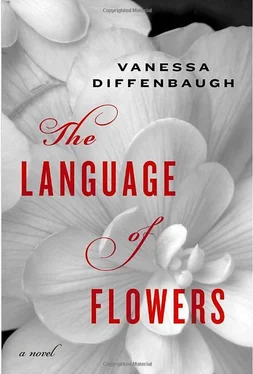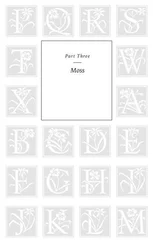I poured myself a glass of orange juice and sat on the floor, looking into the baby’s basket. When she awoke, I would nurse her, and when she was done eating, we would go for a walk. I would carry the basket down the stairs and out the door, and the fresh air would be good for us both. Maybe I would carry her up to McKinley Square and give her a lesson in the language of flowers. She wouldn’t respond, but she would understand. She had the kind of eyes, when they were open, that made me believe she understood everything I said and much of what went unspoken. They were deep, mysterious eyes, as if she was still connected to the place from which she had come.
The longer the baby slept, the more the despair subsided until I could almost make myself believe I had overcome its gravity. Perhaps my brief escape to the grocery store had not caused permanent damage, and I was, as Mother Ruby insisted, capable of the task before me. It was unrealistic to think I could make a clean break from the way I had lived for nineteen years. There would be setbacks. I had spent my life being hateful and solitary, and I could not, overnight, become loving and attached.
Lying down on the floor next to the baby, I breathed in the damp-straw smell of the basket. I would sleep. But before I had closed my eyes, her rhythmic breathing was replaced by the familiar sound of her open, searching mouth.
I peered into the basket, and she looked at me, her eyes wide open, her mouth moving. She had given me an opportunity to sleep, and I had wasted it. There would not be another for hours, if not days. I picked her up. My eyes welled, and when her jaw clamped down, the tears leaked onto my cheeks. I brushed them away with the back of my hand. The relentless suction on my breast pulled the despair up from wherever it was that it had receded, whistling forth like the quiet roar of a conch shell, a reflection of something greater.
The baby nursed for an eternity. Transferring her from one side to the other, I checked my watch. It had been a full hour, and she was only half done. My sigh became a low moan as she latched on again.
When she finally fell asleep, I tried to replace my nipple, still tight between her lips, with my pinkie finger, but she cracked her tired eyes open and began to grunt in complaint.
“Well, I’m done,” I said. “I need a break.” I set her on the couch and stretched. Her grunts became a series of soft cries. I sighed. I knew what she wanted, and I knew how to give it to her. It seemed like it should be so simple. Maybe it was simple for other mothers, but it wasn’t for me. I had handled her touch for hours, for days, for weeks, and I needed just a few moments to myself. As I walked to the kitchen, she began to cry harder. The sound pulled me back.
I sat down and picked her up.
“Five more minutes,” I said, “and then we’re leaving. You don’t need any more.”
But when I placed her in the basket five minutes later, she cried as if I was sending her downriver, as if she would never see me again.
“What do you want?” I asked, the despair in my voice bordering on anger. I tried to jiggle the basket like Marlena had done, but when I shook it, she bounced and cried harder.
“You can’t be hungry,” I pleaded, leaning close to her small ear so that she could hear me over the sound of her own cry. She turned her face to mine and tried to attach herself to my nose. A hysterical sound escaped my body; a snorting that would have been mistaken for a laugh by an observer unaware of my approaching implosion.
“Fine,” I said. “Here.” I lifted my shirt and forced her onto my breast. She struggled to open her mouth against the pressure of my hand. When she finally got it open, she stopped crying and began to suck.
“This is it,” I told her. “You better enjoy it.” My words were threatening, and I listened to them as if they were coming from someone else.
Still nursing, I held on to the baby with one hand and crawled into the blue room, reaching in for the bag of formula and dumping it out. Six cans scattered on the floor. I reached to pick one up, and the baby lost her hold on my nipple. She began her heartbroken wail.
“I’m right here,” I said as I crossed the room and set her on the kitchen counter, but my words didn’t comfort either of us. The baby writhed on the countertop as I poured the can of formula into a bottle and screwed on the lid. Resting the plastic nipple against the baby’s lips, I waited for her to open her mouth. When she didn’t, I opened her lips with my fingers and forced the nipple inside. She gagged.
I took a breath and tried to calm myself. Carrying the baby and the bottle to the couch, I sat down and adjusted her position until her head was tucked into my elbow. I kissed her between the eyebrows. She tried to latch on to my nose again, and I slipped the bottle into her open mouth. She sucked once and then turned away, the formula dribbling out of the side of her mouth. She began to scream.
“Then you aren’t hungry,” I told her, setting the bottle down too hard next to me. A thin stream of liquid shot out the top. “If you won’t eat this, you aren’t hungry.”
I set her back in the basket gently. I would let her cry for two or three minutes, just to prove I was serious. When I picked her up again, she would take the bottle. She had to.
But she didn’t. I let her cry another five minutes, and then another ten. I tried holding her. I tried feeding her in the basket. I tried laying her on my featherbed and reaching inside with the bottle, but still she refused to suck. Finally I gave up and closed the half-door. The baby cried out in the darkness of the blue room, alone.
Lying down on the living room floor, my eyes closed involuntarily. The sound of the cry became something distant and unpleasant but no longer overwhelming. For stretches I forgot the source of the sound or why I had tried to stop it. It passed over my body, leaving me untouched. The fog of my exhaustion was impenetrable.
It wasn’t until the crying stopped that I jolted awake. I felt a rush of fear that I had killed the baby. It was dark outside. I had no idea how much time had passed. Perhaps hours without food and a room without light was enough to kill a newborn. I knew so little about newborns, about children, about human beings. It felt like a horrible joke to leave me alone with a baby, responsible for another life. I threw open the door to the blue room, but before I could even reach out to feel for her pulse, she began to cry.
My body was flooded with emotion, relief but also undeniable disappointment, followed immediately by shame. I held the baby to my body, kissing her head in an attempt to mask the desperation I could no longer bury. I stuck the bottle in the baby’s mouth. She would learn to drink formula. Breast-feeding was too much for me. I would never be able to maintain it, and if I wanted to keep the baby, I needed to find a way to be a mother that I could handle. This time the baby tried to suck, but her lips were weak with hunger and the plastic was stiff and unresponsive.
The nipple must be defective. It was the clear explanation for my baby’s stubborn refusal. Of the hundreds on the shelf, I had purchased the cheapest. I hurled the bottle into the kitchen, and it bounced off the wall and onto the floor. The baby began to cry.
I set her in the basket and walked away. My breasts were full and dripping onto the stained office carpet, but I would not give her milk from my body. It was too much. I would get her a new bottle, and she would take it. My panic would subside.
I took the steps two at a time, her cry growing louder as the distance between us increased. Running out onto the sidewalk, I sprinted the block faster than I ever had in my life. I crossed streets recklessly, running in the same direction I had to buy the formula just the day before. But when I got to Vermont Street, I turned left instead of right. I didn’t think about where I was going, and I did not stop running until I reached the steps of McKinley Square. Digging heavy feet into the mowed lawn, I fell into the white verbena, rolling into my cavern beneath the heath and closing my eyes. I would give myself five minutes. Just five minutes in the park, and when I returned to the baby, I would be able to handle it. I covered my head with my arm, searching in the darkness for the brown wool blanket that wasn’t there. Sleep pulled me under again, and I was protected, rocked, comforted. There was nothing but the darkness, the solitude, and the white petals of the verbena praying for me and for the child I wouldn’t let myself remember.
Читать дальше












